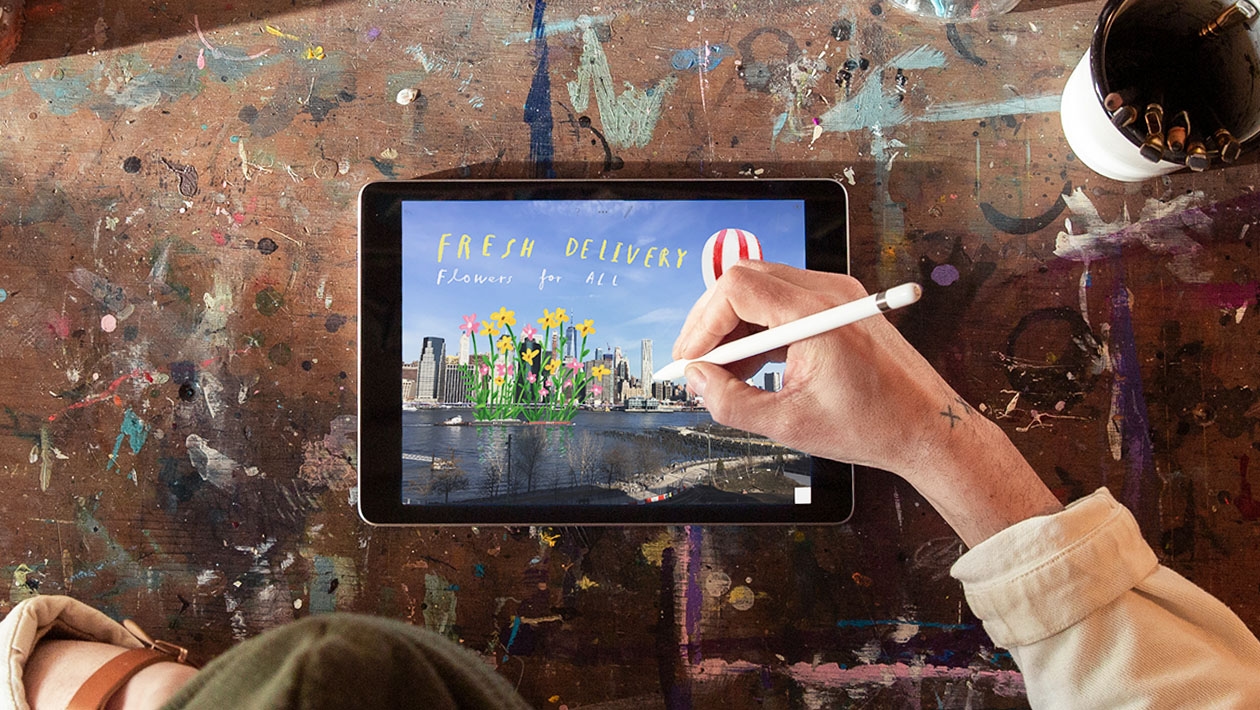Using Markup on an iPad, students will utilize research and creativity skills to transform a photo of their shoe into a "brand" embodying the essence of a historical figure.
Many of today’s students are fascinated and even obsessed with shoe brands and designs. This Pop Art project taps into their interest in shoes to “kick off” a creative activity that will inspire their learning and reflect their understanding of a historical figure.
Objectives:
For this project, students are challenged to transform a photograph of a shoe into a “brand” design that represents the life of a historical figure. They will conduct research about their chosen individual, and this research will be reflected in the shoe design they create. This project is adaptable for learners of any age and can be tailored to match their skill level while addressing various learning objectives, particularly in the areas of history, social studies, or biographies.
Project Introduction:
Begin by engaging students in a discussion about shoe brands:
- What are their favorite types of shoes?
- What do shoe designs represent or suggest to them?
- Is there a famous individual who endorses or is known for wearing certain brands of shoes?
- What aspects of that person's life and character correspond to the elements present on the shoe?
(Note: This project is not confined to athletic shoes, although they might be simpler for students to grasp and capture. High heels, sandals, slippers, and even flip-flops could be utilized. The teacher may want to provide a variety of shoes for students to use if they have creative ideas extending beyond athletic shoes.)
Research Process:
Research about the historical figure could entail gathering simple facts or delving into more detailed information, depending on the students' age and the learning objectives. It doesn't necessarily need to be presented in the form of a traditional written report.
- For younger students, reading a story together about a famous person and collectively creating a list of facts could be effective.
- Older students could conduct independent research through books or online resources. (HINT: Using tools like Apple Notes or Freeform to compile facts and ideas might be helpful.)
- Discuss with students how images and visual elements could be employed to represent a person’s life. These elements might include objects, symbols, locations, inventions, tools, colors, and anything else reflective of the historical figure's life. (HINT: Students could use Apple Notes or Freeform to sketch out ideas, to design with the shape library, or to drag/drop photos into their research notes. Additionally, finding emojis that represent their chosen figure might provide further inspiration for their design.)
Design Process:
Students begin by taking a photo of a shoe, either their own or one provided by the teacher. They need to decide whether they prefer a side or top view. (Hint: Use a plain piece of poster board as a background. For contrast in the photo, use a darker color as the background if the shoe is light-colored, and vice versa. Enable focus and take a photo that fills up most of the screen.)
- Save and duplicate the photo after each step to avoid starting from scratch in case of any mishaps during the drawing process.
- Follow the steps outlined in the Create Pop Art project convert the photo to black and white, and adjust the contrast and saturation settings. Save and duplicate.
- Use the Mark Up drawing tools to color in the background using a marker. (Hint: Think creatively about a background color that might represent an aspect of the historical figure’s life. For instance, I used blue to symbolize the sky that Galileo explored. I also added a creative touch to the background by lightly shading in white with a transparent white crayon to suggest stars and galaxies. However, keep the background simple to maintain focus on the shoe.) Save and duplicate.
- Add drawings, symbols, and shapes to the shoe design, while trying to retain some features of the original shoe design in the decoration. (Hint: For example, I turned one of the stripes on my shoe into a telescope and changed part of the heel design into a compass tool that Galileo used. I added the star shapes from Markup onto the heel area. I colored one of the stripes black where I wrote the “Galileo” as a brand name.) Encourage students to think creatively by asking reflective questions as they work. Save and duplicate.
- I found it was easier to add the white border and black line details (which are a part of the Create Pop Art project directions) after the shoe had been decorated. This enables students to clean up any messy strokes and ensures a clean border around the shoe. Save the final design.
Student Reflection:
After completing their shoe design, students should demonstrate their learning by explaining how their shoe reflects the life of their chosen historical figure. This could be done orally, in writing, or through an audio or video recording. The shoe design and accompanying explanation should indicate a deep understanding of the historical figure, rather than merely regurgitating basic facts that were copy/pasted from the internet.
Project Extensions:
This project isn't limited to historical figures. Shoes could be created to represent book characters, artists, or a student’s hero. They could also depict historical eras, current events, or cities/countries. Science-themed shoes could showcase habitats, inventions, or animal groups. Another idea is for students to create a shoe representing themselves for an open house event. Other clothing items, such as socks, hats, and t-shirts, could also be utilized and transformed into Pop Art.
Do you have any ideas on how this Shoe Pop Art project could be integrated into your classroom? Share your thoughts in the comments below. Thank you!
Learn how to Create Pop Art today >













April 13, 2024 . English
English
What an amazing idea for students to create with photos! Thanks for sharing!
This action is unavailable while under moderation.
This action is unavailable while under moderation.